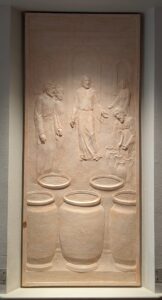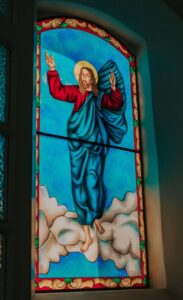Sheep and Goats – Which?
 Sheep and goats represent a frequently recurring image in both Hebrew and Christian scriptures. I don’t know about you, but I have not personally had a great deal of experience with either sheep or goats outside of petting zoos.
Sheep and goats represent a frequently recurring image in both Hebrew and Christian scriptures. I don’t know about you, but I have not personally had a great deal of experience with either sheep or goats outside of petting zoos.
Given my great lack of knowledge of either sheep or goats, I asked my sister, who raises alpacas and has a sheep as well, to help me understand how sheep and goats are similar and how they are different. Her daughter-in-law, my niece, raises goats, so my sister also got feedback from her. It made for a very enjoyable afternoon’s texting.
Here’s what I learned.
- Goats are smarter than sheep and can figure out puzzles, “like how to open a gate.”
- “Goats are leaders, sheep are followers.”
- “Goats are hardier and easier to take care of than sheep, in my experience…”
- Both have similarities regarding food and other animal habits, but there are differences.
- Sheep will knock over anything or anyone, including the shepherd, who is in the way of where they want to go, especially if they are frightened or in a hurry.
- Sheep are very food and instinct oriented and will ask for food and water even when they already have them.
- “Sheep are complete idiots and rude,” quoth the goat herder in a short text.
- Endearing qualities of goats? “They love treats and are a lot hardier.” Again from the goat herder.
- Goats will come up to a person and wait to be petted. If they think they are being ignored, “they will stick their heads over the fence so you can scratch their nose or between their horns.”
- Both sheep and goats can be sources of milk and fiber/wool. Some types are more suited to one or another product.
- Goats can be used to pull carts. Their horns make it easier to keep a halter on those with smaller ears.
- Sheep can sleep outside in the snow – their wool keeps them warm under the snowy blanket. When they wake, they can eat snow rather than needing to drink water.
- Sheep will ‘Pogo’ when they are happy or in a hurry to get somewhere – “hop, hop, hopping … their little feet hitting the ground.”
Many thanks to these two lovely ladies for their insights.
These exchanges left me wondering why it’s the sheep who get the good press in the Bible.
In the Book of Ezekiel, the king and religious leaders of Israel get the blame for having caused the great troubles of defeat and exile of the nation under their leadership. Ezekiel, in a passage before the one we see this day, decried the fact that they had taken advantage of the poor, the sick, the injured, and those who were lost souls among the people. The job of the King and religious leaders, in God’s view as expressed by Ezekiel, is to look out for those who can’t take care of themselves and need help.
Speaking through Ezekiel, God proclaims, “I myself will look after and tend my sheep.” (Ez 34:11-12, 15-17) God promised to rescue these sheep from everywhere they have been scattered and bring them to a safe pasture. This shepherd will go out and find those who are lost, tend the wounds of those who are injured, and heal the sick ones. But “the sleek and the strong” will be destroyed – those who did not use their strength to help and protect the others.
On a final note, the prophecy declares, “As for you, my sheep, … I will judge between one sheep and another, between rams and goats.” (Rams are unaltered male sheep.)
There we go again. Sheep versus goats? There must be something else beneath the surface that a non-shepherding culture doesn’t notice.
It is possible to have both sheep and goats in a herd. Goats can help protect the sheep from predators, because they tend to be more aggressive. They’re not going to turn and run away in panic when they perceive a threat. They eat different plants than the sheep, so the pasture can support more animals.
Ezekiel is not the only one to speak of sheep and goats. In Jesus’ description of the end of times when he will return in glory with the angels and sit in judgement over all the nations, he speaks of sheep and goats as well. Matthew’s narration of this event is the only version of this that we see in the Gospels. (Mt 25:31-46)
People will be divided into two groups, just as a shepherd separates the sheep from the goats. The sheep will be gathered at Jesus’ right hand and the goats at his left. Then he will tell those on the right, “Come … inherit the kingdom prepared for you… For I was hungry and you gave me food…” These were the ones who took care of the hungry, the thirsty, newcomers, those without adequate clothing, the ill, the imprisoned. They are surprised to be singled out for this, especially since they didn’t recall ever doing any of this to/for Jesus personally. He explains that doing it for “one of the least brothers of mine” was the same as doing it for him.
Those on the left-hand side are chided for not caring for the hungry, thirsty, naked, and so forth. Again, they don’t recall ever seeing Jesus needing these things. Yet Jesus applies the same logic to them. What was not done for the little ones, the least of God’s people, Jesus’ brothers and sisters, was not done for him.
Here we still are, with the sheep getting the good press and the goats getting the bad.
I think part of what we are seeing is that the ancient Hebrews started as shepherds, so there’s a long history with these animals and their care. Abraham was a shepherd. He probably had both sheep and goats in his herds. Both species have useful qualities and together they can provide a more complete set of products for supporting a household, especially a group of herders who travel from place to place with their animals. Goats, with their intelligence and tendency to be more aggressive, might be a bit more challenging at times. But these same qualities would make them a useful addition to the mix. The shepherds and their dogs could use the help of other animals in protecting the entire herd. Still, if there are too many goats, it could also be a problem, especially when it comes to growing the herd and mating time. Intermixing the species is not a successful strategy in such instances.
Another thought that comes to mind is that sometimes, it’s best just to follow the rules and do what is the right thing, even if it’s not the most clever or flashy. When we get too clever and try to outfox the rules to get a better deal for ourselves, it’s not going to lead to our serving the poor or those who can’t get a leg up in life on their own. We too easily get focused on our own needs and wants and find ways to justify meeting those first. God, the shepherd, wants us to look out for each other and will support us as we do. We don’t have to go running off slyly on our own like the goats, figuring out how to unlock the gate to have a good life.
One other thought, which comes from Catherine Cory in the Workbook for Lectors that we use in our parish, is that the words translated as sheep and goat do not necessarily refer only to the animals we categorize by that name. She suggests that the term translated as sheep refers to small grazing animals, not just sheep. The term translated as goats refers to small creatures that are “woolly.” She suggests that those Jesus called sheep are the mature ones who are ready to enter the kingdom of God. The others are unready to enter. They have not matured properly and become ready for the kingdom. The way to become ready, is to serve the hungry, the thirsty, the imprisoned, the sick, and so forth. We call these tasks the Corporal Acts of Mercy and we are all called to this service.
As we end our liturgical year with this Solemnity of Our Lord Jesus Christ, King of the Universe, let’s pray that we have grown in maturity this past year and will continue to grow in the year to come. It’s not just the sheep in my sister’s yard who should go hop, hop, hopping quickly towards a special treat or person. We, the sheep of our Lord and God, need to hop, hop, hop along together in joyful service, meeting our Savior in all those we encounter.
Readings for the Solemnity of Our Lord Jesus Christ, King of the Universe – Cycle A
Read More



















